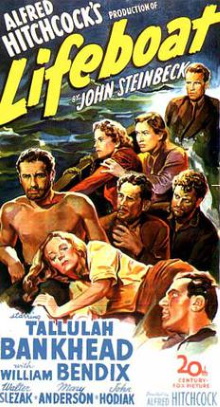I’ve learned how pointless it is to say that this next one might be the last Hitchcock film I need to watch and someone always has something interesting to say about one of his work that I’ve yet to watched. This is an early one that is set entirely on a single lifeboat in the middle of the ocean. The script was written by John Steinbeck but apparently it was Hitchcock who came up with the initial idea. As usual the great director makes it work and despite the limited nature of the setting this wasn’t a cheap film to make either as filming on water is notoriously expensive and some of the stars were rather expensive.
In the depths of World War 2, a merchant ship is sunk by a German U-boat but manages to destroy the submarine as well. A handful of survivors gather on a lifeboat including journalist Connie Porter. Another survivor is a woman with an infant who is already dead when brought aboard. Despite the others trying their best to calm her and even tie her down, one night she simply disappears overboard. The most contentious survivor is a man who turns out to be a crew member from the U-boat named Willi. Some of the group argue that he should be killed while others are horrified, saying that it would be wrong and is anyway a war crime. Eventually however they realize that he is the one who is the best sailor among them and allow themselves to be guided by him, even after Connie tricks him to reveal that he is actually the captain of the U-boat. Yet despite the group’s mercy and kindness, Willi still secretly plots against them.
As per the title, this is a film that takes place entirely on a lifeboat and so the only characters in it are those who make it onto the boat. Hitchcock was so committed to the limited setting that he decreed that there would be no musical score as there was no space for an orchestra. This does indeed heighten its stark realism and furthermore this film is much more brutal than I would have expected for an American film of its era. Having the infant die early on and having the mother follow shortly after is crucial in convincing us that there is no plot armor here and the group really could die. I do think that the film overdoes it a little by having the characters be so incompetent in securing what little supplies they have on board. A running gag has Connie be steadily divested of her material possessions, her camera and typewriter, valise and fur coat as accidents lead them to be lost overboard. It’s an effective form of black humor but surely you’d be a lot more careful about securing your stuff the first couple of times that happens. I also feel that the film has way too much dialogue. Modern films are better in that regard, understanding that even silent scenes can be effective at building characters.
One of the most interesting things about this film is that when it was first released it came under heavy criticism for an overly sympathetic portrayal of the German captain. Watching it today however it’s hard to see it as being anything but wartime propaganda as the Germans are the clear villains of the piece. I believe this film would be better if there had been more genuine tension among the survivors arising from personality and class differences. Instead the fact that the German captain really is plotting against them subsumes all other conflicts. There is also some moralizing here that Willi fares so well against them and looks more heroic because he knows what he wants and is so determined while the rest are divided and hesitant. Hitchcock actually does seem to be telling the Allies not to hold back and not to allow the Axis Powers to use their decency and mercy against them. This kind of message might make sense for its time, even if people seem to have misunderstood the director, but it ages poorly.
I do admire what this film is trying to do and it is excellent work. But it’s also so closely tied to the World War 2 setting and there is just so much talking. In terms of the stark struggle for survival at sea, it loses out to J.C. Chandor’s All is Lost though that one is arguably a different genre entirely with no social dynamics. I’ve love to see a more modern treatment of this concept with psychologically more complex characters.
